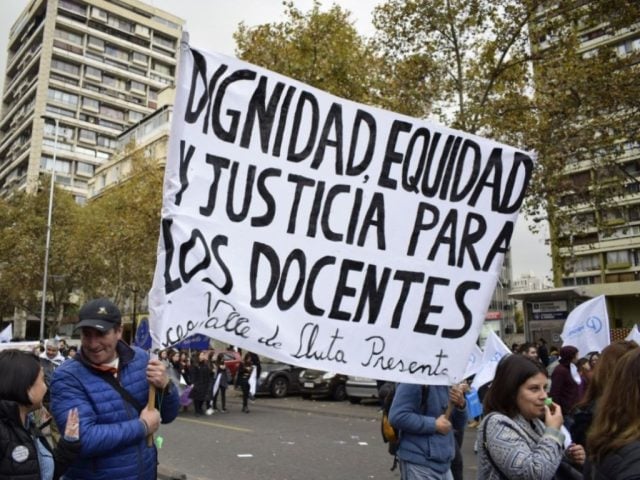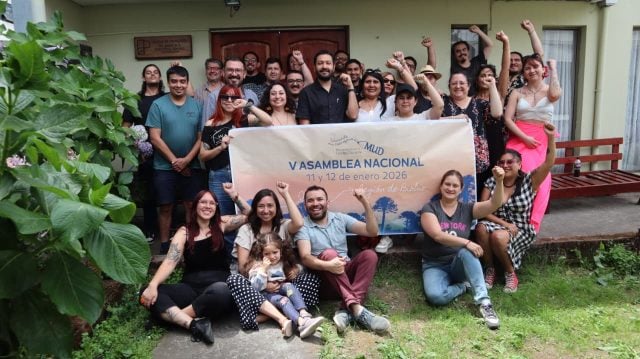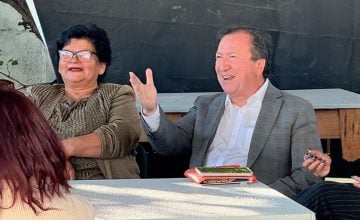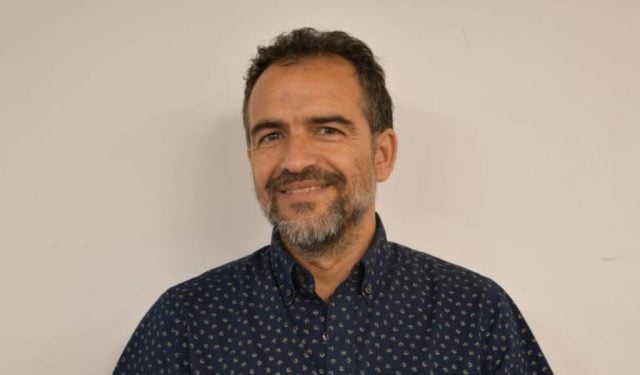Every October 16, Chile celebrates Teacher’s Day, a date that commemorates the founding of the Teachers’ Association and highlights decades of challenges in public education, from historical debts to the shortage of teachers in schools.
From Sarmiento to Gabriela Mistral: The Evolution of Teachers’ Day
In 1943, the First Inter-American Conference on Education was held in Panama, uniting educators from across the Americas. It was at this event that September 11 was established as Teachers’ Day, honoring the Argentine teacher Domingo Fausto Sarmiento and his contributions to Latin American education.
On September 11, 1943, under the presidency of Juan Antonio Ríos and with Benjamín Claro as Minister of Education, a decree was issued declaring: «September 11 is designated ‘Teachers’ Day’. Annually, civic festivities, vigils, and other educational events will be held in the country’s educational institutions.»
However, the situation changed decades later. In 1974, the Military Junta moved Teachers’ Day to December 10, coinciding with Gabriela Mistral’s Nobel Prize in Literature award in 1945. This decision also aimed to prevent the celebration from aligning with the anniversary of the military coup.
Yet, in 1977, a new adjustment definitively set the celebration for October 16, aligning it with the founding date of the Teachers’ Association of Chile, which was deemed more suitable for educational institutions to organize their commemorative events.
Restoration After More Than 40 Years
When discussing Historical Debt in education, we refer to the salary debt affecting thousands of teachers who were economically harmed during Augusto Pinochet’s dictatorship due to the municipalization process of public education initiated in 1981.
This process involved transferring the administration of educational institutions from the state to municipalities, resulting in many teachers missing the salary adjustments dictated by the ‘Article 40’ of 1981.
This law provided a salary base increase and a non-taxable special allowance for teachers under the Ministry of Education. However, upon being transferred to municipal administration, their new employers disregarded these acquired rights, generating an outstanding debt from the state and educational institutions.
More than four decades of advocacy by the teaching union have led to the government of President Gabriel Boric proposing a reparative measure, which was approved by Congress earlier this year.
The initiative proposed a compensation amount of $4,500,000 for each affected teacher, to be paid in two annual installments: one in October and the other in January, over a period of six years, from October 2025 to January 2031.
The proposal will benefit approximately 57,000 living teachers who were transferred to municipal administration between 1980 and 1987, prioritizing older teachers and progressing through age groups.
On October 17, more than 15,000 teachers will receive the first installment of the promised compensation. Educators can check if they are among the initial beneficiaries and track the status of their application on the Ministry of Education’s online platform.
This restoration of the historical debt signifies a form of social justice and acknowledgment of the harm inflicted on thousands of teachers during the dictatorship. It also represents the Chilean state’s commitment to remedy the violation of labor rights and strengthen democracy in the country.
Teaching Profession at Risk: Challenges and Disincentives
The National President of the Teachers’ Association, Mario Aguilar, spoke with El Ciudadano about the numerous challenges facing education in Chile today, particularly those related to the working and emotional conditions of teachers.
Aguilar warned that the educational system is experiencing a deep crisis, reflected in a high teacher dropout rate, a phenomenon that should raise alarms among authorities and society as a whole. He noted that over 23,000 teachers have left the school system despite having begun their careers, a statistic recently reported in the press that underscores the level of burnout and demotivation in classrooms.
“This must be paired with a strengthening of the teaching role, ensuring work conditions for teachers that prevent this alarming dropout rate, which illustrates the challenges of working in this profession today, making it one of the central challenges of our educational system,” he said.
For Aguilar, aside from high turnover, the key challenge is strengthening public education, which requires more resources and effective measures to tackle the structural issues currently affecting school communities.
“This seems to me a central challenge, along with reinforcing public education, the need for more resources, and addressing serious problems facing our system today, such as issues of coexistence, aggression, violence, and work overload, among others,” he stated.
Finally, Aguilar remarked that while there is consensus on the importance of inclusive policies like inclusion programs, these lose effectiveness when they lack funding or adequate conditions for implementation, reducing good intentions to mere paperwork.
Conversely, in conversation with El Ciudadano, Samanta Jorquera, Regional President of the Teachers’ Association of O’Higgins, highlighted the main challenges facing education today, stating that “the discourse we have maintained as teachers is one of deep neglect of public education over the past decades, manifesting in various expressions.”
Firstly, Jorquera pointed out that the ongoing decline in enrollment in municipal schools and now local education services has led to the closure of many establishments, especially rural ones, which could not sustain operations through the subsidy system. For her, this phenomenon shows the progressive abandonment of many schools and lyceums across the country.
The regional president also emphasized that school infrastructures are deteriorating and inadequately respond to winter or summer weather conditions. This physical neglect of facilities reflects the difficulty in maintaining adequate and safe educational spaces for students and teachers.
Jorquera also stressed that the teaching profession faces growing neglect, as it is currently unattractive and lacks substitute teachers. Pedagogy programs are not filling their spots, indicating that the issues extend beyond salaries.
Moreover, she pointed out that the working conditions teachers face are central to this crisis. Low incomes and a lack of structural support discourage new generations, impacting the quality of education and the continuity of educational efforts throughout Chile.
“Thus, we consider it essential for the state to assume the responsibility of guaranteeing a strengthened public education. That means a shift in funding, transitioning to base funding; strengthening schools within their community spaces, where needs and objectives can be established as educational communities; addressing the role of the manager, which impedes internal democracy within institutions; and, of course, a more contextualized curriculum from the perspective of the teaching profession,” Jorquera stated.
In that line, the educator highlighted the importance of the Teacher Tenure Bill, which aims to provide job stability for teachers in the public system who have worked in municipalities, corporations, or local education services for several years, allowing them access to fixed positions with guaranteed rights and protection against arbitrary dismissals.
“This is crucial in a context where we see a systematic abandonment of young teachers in the education profession, alongside the need to end the mistreatment teachers face daily,” she commented.
Additionally, Jorquera emphasized that as a region, they are in the process of transitioning to local education services and that one of the priority demands is to participate in public policymaking and have clarity regarding how these processes are being executed, ensuring transparency in infrastructure transfers, teacher hours, and the preservation of rights when moving from the municipal system to local services. Furthermore, she stressed the urgency to address the current violence issues affecting teachers. “This means there needs to be swift legislation on the school coexistence bill currently in Parliament,” she declared.
Jorquera also expressed concern about the lack of legislative progress and joined the national complaint regarding the failure to approve the Tenure Law yesterday. She noted that several regional deputies, with whom they met under the lobbying law, had committed their votes and even provided suggestions to improve the bill. However, none of those legislators ultimately showed up.
“We are talking about Deputy Raúl Soto, Deputy Félix Bugueño, Deputy Cornejo, Deputy Romero, Marta González, and Marcela Riquelme, with whom we spoke. And none of the six showed up for the vote yesterday. Therefore, today we demand that they uphold their word,” the educator stated.
Finally, Jorquera sent a message to teachers across the country:
«The message we send as the Regional Teachers’ Association of O’Higgins is that in these conditions of absolute precariousness and devaluation of our work, the path to improving and transforming the reality of teachers is unity, organization, and putting our most needy children at the educational center. It is to advance towards a pedagogy that fosters critical thinking, creating social beings, children and young people who reflect more on life and are committed to society. Our call is, therefore, to strengthen the union, to strengthen unity, to enhance coexistence as teachers,» she concluded.
Original article: Día del profesor: un día para recordar la historia y la lucha de los educadores










